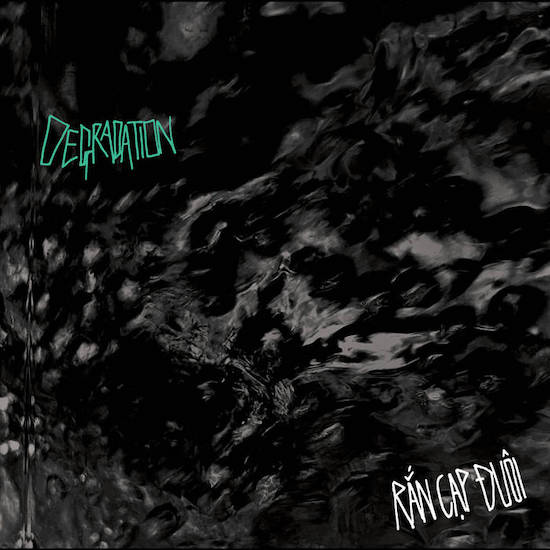They more often refer to themselves as Collective, and that seems to be a reasonable term to describe the way these Vietnamese musicians operate: several members growing from an initial two, different names cropping up on different releases depending on the sound or the instruments used. Degradation, assembled as a trio of Lam Lam, Đỗ Tấn Sĩ and Zach Sch, is the first output to be distributed by an actual label: Flaming Pines, whose boss Kate Carr has created valuable psychogeographical sound art in recent years as well as the artwork for this release. Like the name, it’s slimmed down, at three tracks and 24 minutes, but has much to recommend it for fans of non-linear granular electronic darkness.
Sonically inspired, say Rắn Cạp Đuôi, by monsoon season in Vietnam as well as a more abstract sense of watery immersion/submersion, this is tangible in the opening track, an assembly of glitchy crackles, springy dub FX and pattering quasi-rhythms. ‘Ikkikki’, while not harsh or extreme, is ceaseless in its layering and looping of miniscule, clockwork-like elements, pointing simultaneously to Autechre’s inverted groove and Alva Noto’s hi-concept austerity. ‘Ripples’, at five minutes the shortest track here, is dronier and more uneasy, alarming even: vocals, credited to Harvey Stauss, are themselves processed into blurry dreamstate drones as synths affect a whirring chopperblade intensity. ‘Degradation’ the track, closing Degradation the EP, is noisier and more monotonous than its predecessors, grinding synth distortion pulling back and rearing up like organ bellows as a bulging bassline drops every five seconds.
From what I can glean of Rắn Cạp Đuôi they seem fairly young, wilfully online (self-described as a “meme club” on their Facebook page) and not given to taking themselves seriously. Conversely, this latest release is far more solemn – conceptually, aesthetically, stylistically – than other recent music credited to the collective. It would be a slight shame, I feel, to shed the levity in favour of a sort of Ben Frost/Tim Hecker unsmiling grandiosity (which Degradation does hint at), but on this evidence that could be most profitable.


